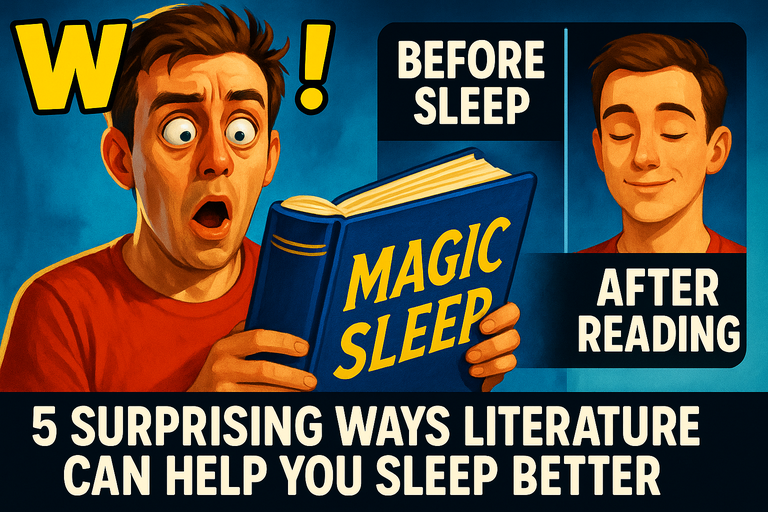- Posted on

Ever tried to read yourself to sleep, only to end up wide-eyed at 2AM, consumed by a plot twist?
We’ve all been there: you pick up a book for a little pre-bed wind-down, next thing you know, you’re pondering the complex morality of fictional politicians or, perhaps more urgently, wondering why your pillow has developed the acoustics of a freight train (thanks, snoring partner). But hold onto your bookmarks, because tonight we’re blending great literature with the science of sleep to find out—can your bookshelf be the ultimate sleep aid?
Turns out, the answer is more nuanced than the characters in Curtis Sittenfeld’s American Wife—the very novel dissected in this captivating article from LitHub.
The Literary Lullaby: Why Books Before Bed Actually Work
Why do so many of us reach for a novel before bed? Is it nostalgia, escapism, or the hope that a few pages of dignified prose will outwit doomscrolling and miraculously cure our insomnia?
Reading, especially fiction, has been shown to:
- Reduce Stress: Thirty minutes of reading can lower your blood pressure and heart rate, prepping your mind for dreamland.
- Distract Your Brain from Overthinking: Fictional worlds absorb your attention, gently crowding out those spiraling thoughts about tomorrow’s to-dos or, say, existential dread.
- Create a Ritual: Consistency is key in sleep hygiene. Picking up the same book every night? That’s a signal to your brain: “Hey, it’s snooze o’clock.”
But not every book is created equal for bedtime—American Wife is a perfect example. It doesn't just lull; it provokes, inviting us to empathize even with the “ugliest” characters. Intriguing, yes, but maybe not the fastest ticket to slumberland. Or is it?
Empathy and Sleep: The Plot Thickens
As the LitHub article points out, Sittenfeld's characters are layered, ambiguous, and—let’s be honest—a little exhausting (in a good way). But there’s method in this narrative madness. Studies suggest that reading nuanced stories can:
- Boost Emotional Intelligence: Engaging with complex characters makes us more empathetic—and feeling understood may reduce anxiety, a notorious sleep thief.
- Offer Perspective: Losing yourself in someone else’s moral messiness makes your real-life dilemmas feel a little less urgent.
So, when you find yourself staying up late with American Wife, you’re not just losing sleep—you’re gaining tools to sleep better, eventually. (Yes, that’s a thing!)
The Plot Twist: What If the Problem Isn’t in Your Head… But in Your Bed?
Here’s the real open loop: You’ve crafted the perfect literary bedtime routine. You’ve learned to love the antiheroes. You’re ready to drift off, only for your partner’s snoring to launch you right out of your REM cycle. Or, let’s be honest, maybe you’re the culprit. (We won’t judge!)
Enter modern sleep solutions. While Sittenfeld invites us to find patience and nuance with others, you might need a little help finding patience with 80 decibels of nighttime nasal symphony. That’s where companies like Snorple’s customizable mouthpiece come in—think of it as giving the “ugliest character” in your bedroom (snoring!) a redemption arc of its own.
Snorple’s microwave-custom mouthpiece is like a novel twist for your jaw: adjusting the story so everyone can get a happy ending. Hypoallergenic, adjustable, and backed by a 30-day money-back guarantee (because not every bedtime experiment deserves a sequel), it’s the sleep science answer to plot-driven drama.
Your New Nightly Ritual: Plot, Page, Peace
If we’ve learned anything from American Wife and the LitHub essay, it’s that sometimes the best stories ask us to linger in the gray areas—not unlike those moments in the middle of the night when you’re half-awake, half-dreaming, and fully aware of your choices.
So, how do you combine literature’s magic with modern sleep science?
- Choose Your Stories Wisely: Save the heart-thumping thrillers for daylight. Opt for something atmospheric, character-driven, and yes, nuanced.
- Set the Stage: Lower the lights, brew your favorite caffeine-free tea, and silence those notifications. Physical books > blue-lit screens.
- Address the Obstacles: If snoring is turning your reading nook into a stadium, consider a gentle upgrade—a truly customizable solution so even the noisiest nights have a plot twist in your favor.
The Final Chapter
Next time you reach for your bedside novel, remember: a book—and a little innovation—might just transform your bedtime from drama to dreamscape.
What’s your favorite book to unwind with at night? Ever tried a sleep gadget that works better than a boring memoir? Drop your thoughts below—because every great bedtime ritual deserves a sequel!